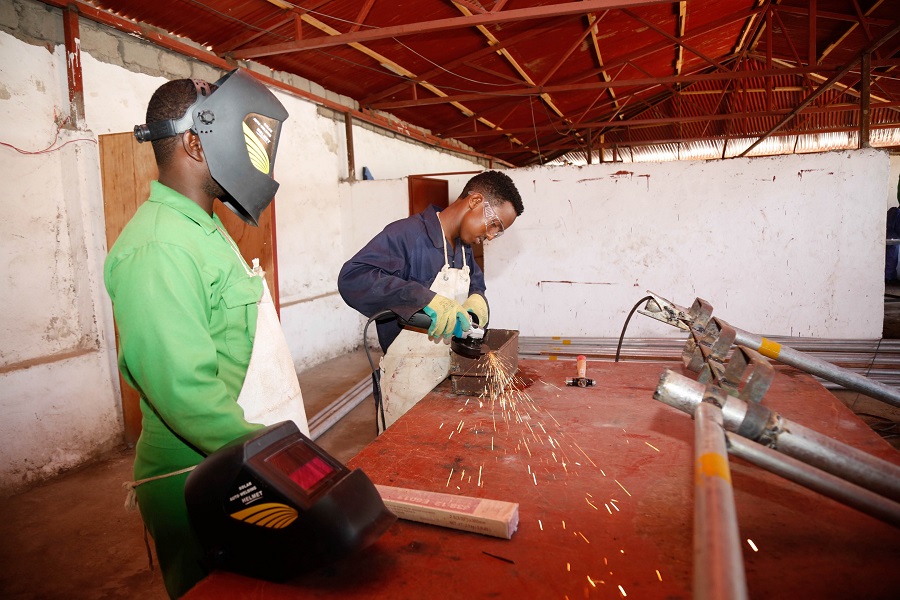Covid-19 response: inclusion of rural youth in Sub-Saharan Africa

By Pamela Pozarny, Tony Nsanganira & Janetta Carlucci
COVID-19 continues its rapid spread around the world, presenting a global health emergency and potential major economic and labour market shocks worldwide. Countries, without exception, are taking unprecedented measures to mitigate the human and economic toll of the disease.
While the virus has spread less rapidly in Sub-Saharan Africa (SSA), countries in the region have taken sweeping preventive measures to limit transmission within their borders. Unfortunately, the brunt of the pandemic’s impacts in rural areas will be felt in terms of the loss of livelihoods. The most vulnerable populations, particularly rural youth, will bear the resulting underemployment and loss of employment.
Seventy per cent of youth in SSA are considered working poor, subsisting on US$2 per day or less. Most of them are employed in the informal economy in rural areas as contributing family workers, subsistence farmers, home-based micro-entrepreneurs or unskilled workers. They typically earn low wages, are employed under insecure casual or seasonal work arrangements and often face unsafe, exploitive working conditions lacking forms of legal employment arrangements.
The pandemic response provides an opportunity for policies and programmes to recognize the high vulnerabilities of rural youth, particularly those working in the informal sector. Consequently, new strategies must be created to strengthen the security of employment conditions and incomes, relax or establish more flexible credit conditions, and facilitate access to productive resources needed to ensure their resilience and self-reliance.
As a result of lockdowns and movement restrictions at national and local levels, most informal businesses, which employ large numbers of youth have been forced to close doors. This situation has led to a widespread loss of livelihoods. The restrictions may likely impede the ability of rural youth to take up seasonal employment opportunities, especially for labour-intensive foods such as fruits and vegetables.
Policy responses and measures put in place by governments to halt the spread of the virus are likely to exacerbate existing challenges that rural youth face in engaging in agriculture and agribusiness, such as limited access to productive resources, access to markets, access to information, etc. For example, restrictions on trade and movement make it difficult for young small-scale farm holders to obtain essential inputs and market access to operate their businesses and sell their final products.
The closure of schools and other educational establishments also present potentially adverse outcomes for younger youths. Children may be increasingly tasked to help on family farms to replace the unavailable or unaffordable farm labourers due to the loss of livelihoods of vulnerable families. This can expose them to hazardous or age-inappropriate tasks.
Targeting rural youth engaged in agri-food systems: mitigating adverse effects of the COVID-19 pandemic.
In the context of the pandemic, African governments, with support from development partners, are initiating processes of reviewing impacts of COVID-19. This requires specific attention to rural youth working in the agri-food systems sector. In the immediate term, measures may likely be required to stabilize incomes and livelihoods of youth through expanding social protection coverage to them; using for example cash transfers, food transfers, access to food banks etc.
Towards the medium term, to minimize effects of significant drops in livelihoods, preservation of economic activities and restoration of incurred losses should be addressed. A range of support can be instrumental for youth operating in the agri-food systems. These include the distribution of inputs to young rural casual workers and entrepreneurs, waiving fees to access specific services such as health care, introducing youth-targeted subsidies for smallholder producers and businesses, reducing interest rates on rural credit loans, and reducing fees/tax requirements, among others.
The pandemic response provides an opportunity for policies and programmes to recognize the high vulnerabilities of rural youth, particularly those working in the informal sector. Consequently, new strategies must be created to strengthen the security of employment conditions and incomes, relax or establish more flexible credit conditions, and facilitate access to productive resources needed to ensure their resilience and self-reliance.
The current crisis also calls for enhancement of platforms and mechanisms for youth engagement on planned and implemented interventions. Efforts should be strengthened to improve consultative processes in rural areas, better reflecting the interests and needs of the rural youth. The use of modern information and communications technologies (ICTs), social media and TV, and radio can be especially powerful in this regard.
Ensuring effective coordination of efforts to protect and promote rural youth
As different stakeholders come together to respond to the crisis, it is essential to ensure coordinated actions at all levels. Governments, FAO and partners will need to redirect resources wherever possible within existing national budgets, programmes, and technical assistance to protect the rural youth. New programmes will also be necessary to respond to the needs and challenges of rural youth resulting from the outbreak.
The COVID-19 crisis cannot permit a setback to progress in reducing rural poverty. At this challenging time, we are reminded of the importance of international cooperation. Cooperation that responds to the immediate impacts of the crisis while also protecting the needs of one of the most vulnerable groups – the rural youth.
About the authors :
- Pamela Pozarny, Senior Rural Sociologist, Investment Centre, Africa Service; Rural Poverty Reduction Focal Point for Africa, FAO, Regional Office for Africa
- Tony Nsanganira, Youth Employment Specialist, FAO, Regional Office for Africa
- Janetta Carlucci, Programme Support Consultant, Decent Rural Employment, FAO, Regional Office for Africa